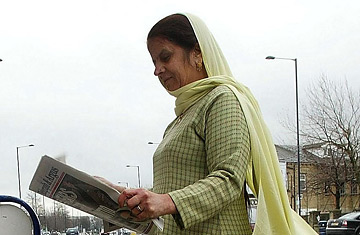
A resident of Bradford, England, reads the local paper after the assassination of Benazir Bhutto in Pakistan overnight.
As Pakistan buried Benazir Bhutto, many of her supporters there turned to violence to express their grief and anger over her assassination. In Britain, where Bhutto has lived off and on in self-imposed exile for eight years until her final return to Pakistan two months ago, the mourning has been quieter and more solemn. But the emotions are just as deep. Many of Britain's estimated 750,000 Pakistanis had embraced Bhutto as a symbol of hope for freedom and stability back home. As Britain's politicians pay tribute to a fallen leader, the country's Pakistanis are trying to come to terms with what her death could augur for their troubled homeland.
Only a few days ago, Muslim communities in Britain were wrapped up in the giddy celebrations of Eid, which marks the end of the annual pilgrimage to Mecca, and the contagious cheer of Christmas. Now, many of those neighborhoods have gone quiet, as Pakistanis — and, in solidarity, Muslims of other nationalities — pay their respects to their fallen heroine. In mosques across the country, Friday prayers were to include a special prayer for Bhutto, and for the past two days, neighbors have been gathering in town halls and community centers to commemorate her.
In Bradford, a town in West Yorkshire with a Pakistani population of around 70,000, some 200 people came together at the local community center to offer their prayers. Rashid Awan, president of the Pakistan Society of West Yorkshire, remembers meeting Bhutto when she visited Bradford in October. "I adored her vision for the future of Pakistan," he says. "Everyone I spoke to last night said she was a courageous and visionary leader. This is not just a loss for Pakistan, but the whole international community. Had she been given the opportunity to lead Pakistan, there was a great hope that the country would be able to fight against terrorism in a collective manner."
Many of Britain's Pakistanis still have relatives in Pakistan, so every conversation about Bhutto is laced with the fear that her death could throw the country into civil war. Some feel that even now, the general election scheduled for Jan. 8 should go ahead, as an essential first step in the political healing process. British Prime Minister Gordon Brown, who yesterday called Bhutto a "woman of immense personal courage and bravery," today announced that he had encouraged Pakistan's President Perez Musharraf to push ahead with the elections, as much as an act of defiance against terrorism as one of democracy. "This was a cowardly terrorist act designed to destabilize democratic elections ... I therefore encouraged President Musharraf to stick to the course he has outlined to build democracy and stability in Pakistan," he said. "I told President Musharraf that the U.K. is prepared to sustain and build the already significant counter-terrorism support we offer his country, not least in the effort to destroy al-Qaeda."
At Britain's High Commission for Pakistan, where the Pakistani flag will fly at half-mast for three days in mourning, diplomatic official Manzoor ul-Haq echoed the Prime Minister's sentiments, saying he thinks the elections should — and will — continue as planned. "The people of Pakistan have great courage," he says, "and they will be able to bring everything under control. We appeal to the people of Pakistan to remain calm. The election process should continue and be allowed to reach its logical conclusion."
Others, though, think that with Bhutto out of the race, elections have become a pointless exercise. Riaz Khan, acting secretary general of the U.K. branch of Bhutto's Pakistan People's Party, had known her for over 30 years. "There is not a single eye that is not weeping," he says. "Even her political opponents in this country are crying. Bhutto was a symbol of unity. She was the only leader who could unite all Pakistan's four provinces. The PPP was the only party that could curb terrorism because it was the only party with the support of the common man. God forbid, I'm very scared for the future of my country."
But Bishop Michael Nazir-Ali, the Pakistani-born Bishop of Rochester, warns against underestimating the Pakistani people. A longtime friend of Bhutto's, who met her when she first came to Britain in the 1970s to study at Oxford — "she used to refer to me half in jest as her favorite bishop," he laughs, "but I don't know how many bishops she knew" — Bishop Michael points out that Bhutto was very aware of the threats against her life. "But she faced a dilemma. She could have ensconced herself behind high walls and armored vehicles, but that would mean losing touch with ordinary people. She decided she would take the risk."
In taking that risk, Bhutto must have been confident that Pakistan could find its own way, even without her, toward becoming a more stable, peaceful nation. "I think her death is a body blow to democracy," says Bishop Michael, "but not a death knell. The political process, the judiciary process and the civil liberties movement all flourish in Pakistan. It would be difficult to stop all of that." Now all Britain's Pakistanis can do is wait and hope that he's right.
with reporting by Theunis Bates/London
